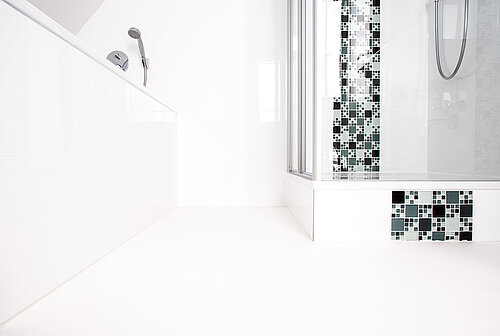
Barefoot suitability class A, B, C with BARiT floors
BARiT floors are extremely resilient and resistant to mechanical influences, which makes them ideal for heavily frequented public swimming pools or wellness areas. They are also resistant to chemicals (e.g. chlorine or other disinfectants), which is a great advantage in swimming pools. All BARIiT coverings are available in all three barefoot categories A, B and C.

Barefoot suitability BARIT floors offer all three classes: A, B, C from low to extremely high
BARIT floors are all tested for barefoot suitability by the DGUV and are characterised by the fact that they can be used in all barefoot suitability classes A, B, C, i.e. from a lower slip resistance (A) to a very high slip resistance (C). A changing room with a toilet facility has a different barefoot suitability than the walkways and shower facilities in a public swimming pool. They consist of a special combination of mineral granules and resin coating and are characterised by their resistance and durability. BARIT floors offer a number of decisive advantages for use in wet, barefoot areas:
1. slip resistance:
BARIT flooring can be supplied with different slip-resistant surfaces to ensure safety in wet areas. The slip resistance can be customised to meet requirements to comply with DIN standards such as DIN 51097 (for wet areas with barefoot traffic). Slip resistance classes from A to C are possible, with class C often prescribed for particularly slippery environments such as swimming pool surrounds.
The surface texture can be designed to provide good grip even when wet, making it safe for barefoot walkers. 2. comfort:
BARIT floors are generally harder than resilient floor coverings such as rubber or cork, as they are often made of epoxy resin or similar materials. However, they offer a smooth and even surface that does not cause unpleasant pressure points when walking.
For areas where barefoot comfort is important, BARIT floors can be combined with special coatings or mats to create a more comfortable walking experience.
3. hygiene:
BARIT floors can be laid seamlessly, which means they have no joints or grooves where dirt, bacteria or moisture can collect. This is particularly important in wet areas, as standing water and germs can be potentially harmful to health.
The smooth, chemically resistant surface makes the floors easy to clean and very hygienic, making them ideal for swimming pools or shower rooms.
4. water resistance:
BARIT floors are highly resistant to water and chemical exposure. This is important in wet areas where floors are constantly exposed to water and cleaning agents. They do not absorb water and are therefore immune to moisture damage.5. resistance:
These floors are extremely resilient and resistant to mechanical influences, which makes them ideal for heavily frequented public swimming pools or wellness areas.
They are also resistant to chemicals (e.g. chlorine or other disinfectants), which is a great advantage in swimming pools.
5. resistance:
These floors are extremely resilient and resistant to mechanical influences, which makes them ideal for heavily frequented public swimming pools or wellness areas.
They are also resistant to chemicals (e.g. chlorine or other disinfectants), which is a great advantage in swimming pools.
6. adaptability:
BARIT flooring can be manufactured in different colours and surface textures so that it fits aesthetically into the respective area and can be adapted functionally.
Conclusion:
BARIT flooring is well suited for wet, barefoot areas, particularly due to its high slip resistance, hygiene, water resistance and resilience. For optimum barefoot comfort, as required in areas such as spas or showers, BARIT offers three different classes of barefoot suitability according to the DGVU test principles of A,B,C. BARIT floors combine both slip resistance and barefoot suitability.


